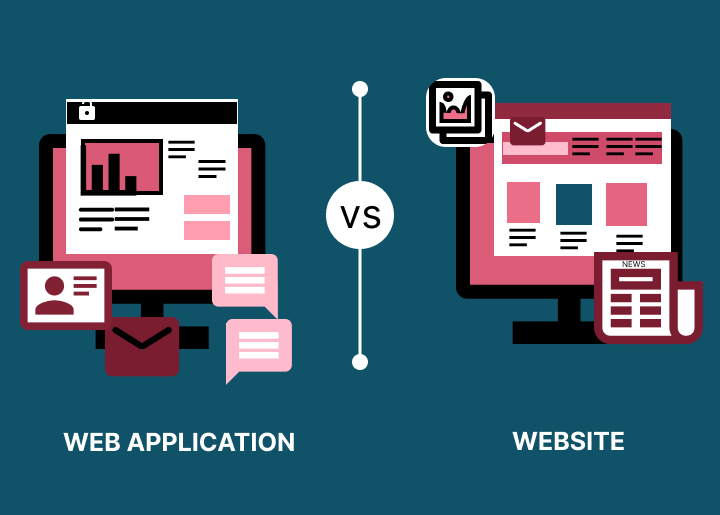Differentiating between a web application and a website can be quite perplexing. At first glance, they may seem quite similar, operating in browsers, relying on internet access, and utilizing similar programming languages for their front and back ends. Moreover, they share common features like interactivity, integration, and authentication.
Nonetheless, understanding the disparities between these two is vital when you’re in search of an online solution for your business. Despite the potentially contentious and overlapping definitions of websites and web applications, they possess distinct characteristics that set them apart.
In this article, we will delve into the differences between web applications and websites to assist you in making an informed decision about which option best aligns with your needs.

Distinguishing Websites from Web Applications
When understanding the disparity between websites and web applications, several key points must be taken into account. These include interactivity, integration, and authentication.
1- Interactivity
The first and foremost point of differentiation lies in interactivity. While a website provides visual and textual content that users can view passively, a web application enables users to actively manipulate data on the page. This interaction takes the form of a dialogue, where users can click buttons, submit forms, and receive responses, such as document downloads, online chats, and electronic payments. Notable examples of web applications include online banking applications, online stores, and social networks.
2- Integration
Integration involves the skill of amalgamating various components to construct a more extensive system. Although both websites and web applications have the capacity to be merged with other software like CRM or ERP, web applications tend to be more commonly integrated due to their intricate functionalities. For instance, the integration of a business web application with a CRM system can facilitate convenient access to customer data and empower the examination of customer behavior and purchasing patterns.
3- Authentication
Authentication refers to the act of inputting a user’s login credentials to gain access to a system. It is a necessary step for web software that deals with personal information. Web applications commonly employ authentication since they offer a wider range of features. For example, social networks require users to register and create a unique identification number to protect their accounts from unauthorized access.
Though both websites and web applications may require authentication, it becomes mandatory for web applications to ensure security. In conclusion, grasping the key distinctions between websites and web applications will aid in selecting the optimal solution for your business requirements.
Special Web Applications: Portals and Online Stores
There are particular web applications that cater to different needs and purposes. Let’s delve into two popular examples:
Web Portals
A web portal is a platform that integrates various applications and content to provide a personalized user experience. It allows users to configure content and receive tailored information based on their needs. For instance, a bank web portal may offer links to account information, bill payments, and deposits. Each of these links leads to a separate web application, which can be accessed from the central hub of the portal.
Online Stores
An online store, commonly referred to as an e-shop, is a web-based platform created to facilitate the sale of goods or services over the internet. The procedure is straightforward: customers select a product and make an online purchase. Subsequently, the system manages the order and handles the payment transaction. Additionally, online stores provide secure payment methods that allow customers to input their credit card details, passport information, email, or phone number, guaranteeing a high level of security for all online transactions.
Choosing Between Website and Web Application Developers
When making the decision of which developer to bring on board, it is vital to carefully assess your business requirements. For a simple company information website, a small web studio could suffice. They have the capability to create an appealing website that showcases your brand effectively. However, if you foresee the need to incorporate intricate web applications in the future, it may be necessary to hire specialized developers.
Conversely, if your project demands a web application with advanced functionalities, such as seamless integration with other corporate systems and robust security measures, you should actively seek out web application developers. These experts possess extensive development skills and can implement a wide range of features tailored to meet your specific business needs.
Final Thoughts
Comprehending the distinction between web applications and websites can assist you in identifying the ideal online solution for your business. If your objective is to showcase information about your products or services, opting for a website would be suitable. Conversely, if you necessitate user engagement and added functionalities like online transactions or seamless integration with other systems, then a web application would be more appropriate. It is essential to meticulously assess the advantages and disadvantages before reaching a decision and to select a developer with the requisite expertise to customize your online presence according to your requirements.